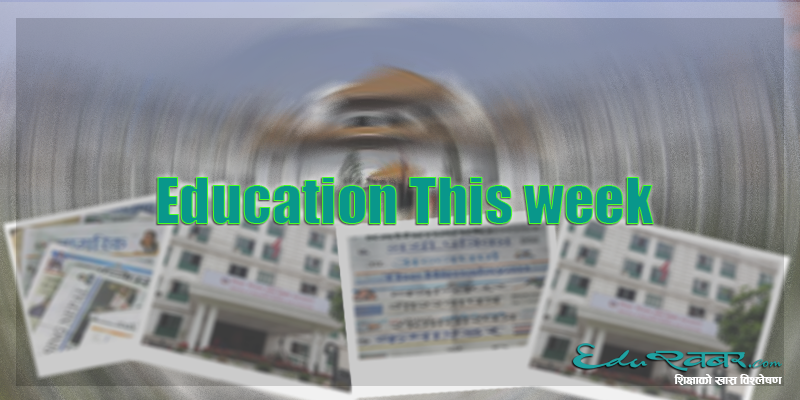
| Abbreviations: MoEST- Ministry of Education, Science and Technology, TU- Tribhuwan University, IOM- Institute of Medicine, TUSC-TU Service Commission, KD-Kantipur Daily, THT- The Himalayan Times, PM- Prime Minister, CTEVT-Council for Technical Education and Vocational Training, KMC- Kathmandu Metropolitan City, SMC- School Management Committee, VC- Vice Chancellor |
- The opinion article ‘Some questions on the proposed Higher education Act’ had stated that former VCs had protested that the universities will be under the domain of government agencies if the proposed higher education Act got approved as it is. There was disappointment on proposed strategy for classification of universities in federal and provincial categories as well. The proposed higher education act will replace all the 12 separate acts of different universities. The act envisions Higher Education Council, chaired by the Prime Minister, to determine the strategy of higher education. The powerful 'University Grants Commission' as the regulatory body of higher education, Integrated University Services Commission for the appointment and promotion of teachers / staff of the Central University and ‘Quality Accreditation Committee' has been envisioned as centralized institutional structure.
- Another article ‘Game to sink Higher Education’ claimed that the government has not been able to receive comments and criticism on the draft of higher education act constructively. The writer suggests the ministry and the committee to rather take the comments from experts and civil society positively to build higher education institutions to address the needs of the students. The writer states that higher education holds key to the future of the new generation and no one should play games with it. The writer states there has been a dangerous gradual degradation of higher education institutions in Nepal. The writer calls for the participatory assessment of higher education institution with involvement of professors, teachers, faculty and teachers to identify the existing limitations and path to improvement. Any intervention done without sincere assessment in participation of personals engaged in the system is likely to fail for bringing the required transition.
- A news stated that some parliamentary members has opposed the proposal to construct ‘Board of Trusty’ structure in proposed MadanBhandari Science and Technical University, suggesting VC structure like in other universities would be more appropriate structure. The Higher Level National Commission on Education had suggested for a Board of Trusty for the University.
- Madi municipality made public 27 programs to ensure quality public schools. The mayor committed to ensure technical education in all public schools. The mayor stated that it will continue with the merger of the schools to ease the quality operation of schools and increase the no. of students per school.
- An opinion article claimed that ‘Students time is being wasted in schools’. The writer further claimed students of 21st century are being taught by the teachers of 20th century through the technique of 29th century and in a education system of the 18th century. The opinion stated of the research that concluded that the involvement of children is schools donot have much impact in how successful the children is going to be. The writer stated that the need to the hour is that the schools could be able to build creative thinking, life-skills action oriented approach and ability for self-evaluation, but at present status, it is failing students from real transformation.
- Jagannath Rural Municipality in Bajura started electronic attendance in schools of the rural municipality. According to the rural municipality office, e-attendance was started with the aim of ensuring timely arrival of teachers in schools. The technology has been introduced in the secondary level in the first phase. Information Officer of the rural municipality reported that e-attendance started from three schools. Administrative Officer in the rural municipality had stated e-attendance was introduced to make educational system more effective and productive. A Secondary School management committee Chair said e-attendance would help ensure timely presence of teachers in schools and would help carry out smooth teaching learning activities.
- An editorial follow up on the news ’19 schools girls accuse teacher of molestation’, stated that the Lalitpur incident clearly shows that school-related sexual harassment and gender-based violence are a serious problem in our education system. In a hand-written letter submitted to the school principal, the students, all below 13 years, complained that their social studies teacher often molested them during the school hours. Though such cases are not often reported or investigated by the school authorities. In most cases, the school authorities do not held the perpetrators accountable, leading to the recurrence of such cases. The school management committee as well as the principal and senior school staff must understand their obligation to properly investigate any allegation of sexual exploitation, harassment or abuse concluded the editorial.
'Education this Week' is a joint effort put to analyze the press coverage of education in Nepal’s selected print media published in Kathmandu. The main aim of this effort is to identify and explain major education issues picked up by the media and give back and foreground of the news.This, we believe, will help policy makers and other responsible people to keep abreast with ongoing concerns and discussions on and around education. EduKhabar, in collaboration with the Center for Educational Policies and Practices (CEPP) , has produced this analysis based on the news printed in Kantipur (Nepali) and The Himalayan Times (English), Dailies andHimal Weekly(Nepali) betweenFeb 12-18, 2020(Magh 29-Falgun 6, 2076)- Editor.
Read this analysis in Nepali : उच्च शिक्षा डुबाउने खेल
Read last week’s analysis : Government fails to act firmly
All analysis read by this link : Education This week
प्रतिक्रिया